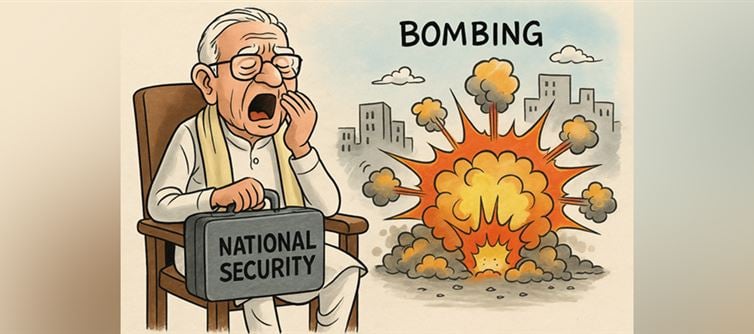
🔥THE BLAST THAT SHOOK MORE THAN JUST A CITY
For nearly a decade, india saw a remarkable decline in major terror incidents outside Kashmir. It became one of the talking points of national pride — a sign of a stronger intelligence network, sharper preventive strategies, and tighter internal security.
But a single attack in the heart of delhi has shattered that illusion of invincibility.
It wasn’t just an explosion — it was a warning shot.
A reminder that security is not a legacy achievement.
It is a living responsibility.
And suddenly, the nation is forced to confront a difficult truth:
Leadership energy, alertness, and sharpness don’t remain the same forever.
⚠️ 1. A capital CITY BREACH IS NOT A SMALL INCIDENT — IT’S A SYSTEMIC FAILURE
delhi isn’t just a city.
It’s the political nerve centre of India.
Breach of security here points to one of two things:
A gap in intelligence
A gap in governance
Either way, the shock waves are national.
For a country that believed it had moved past the era of regular terror strikes, the attack feels like slipping back into a dark chapter.
Security lapses at this level don’t just expose vulnerabilities.
They expose complacency.
🧨 2. A DECADE OF PEACE IS NOT A PERMANENT WALL — IT CAN BE BROKEN IN MINUTES
Public memory is short.
Terrorists’ memory is not.
india enjoyed nearly ten years of relative calm beyond kashmir — a rare achievement in a volatile region.
But peace is not a trophy.
Peace is a process that requires constant vigilance.
The moment the system relaxes, the moment leadership slows down, the moment attention shifts…
That’s when trouble enters.
Delhi’s incident proves this brutally.
🕰️ 3. THE AGE-LIMIT DEBATE: WHEN DOES EXPERIENCE TURN INTO SLOWDOWN?
This is the debate no one wants to have openly:
Should there be a 75-year age limit for political leadership?
Not because older leaders lack wisdom.
Not because they lack contribution.
But because:
Governance requires stamina
Crisis response requires speed
National security requires sharpness
Decision-making requires energy
Public office requires long hours, constant travel, and constant alertness
After a certain age, even the most brilliant minds naturally slow down.
That is biology, not disrespect.
If judges retire at 65,
if bureaucrats retire at 60,
if military chiefs retire early…
Why should the nation’s most demanding job — the job of governing 1.4 billion people — have no age boundary?
🧠 4. SECURITY IS NOT A PLACE FOR FATIGUE OR COMPLACENCY
There is a harsh truth behind every major security lapse:
When leadership slows down, the system slows down.
When the system slows down, threats speed up.
Terror networks don’t age.
Their strategies don’t get tired.
Their motivations don’t retire.
But leadership does.
That’s why nations worldwide debate age limits for the highest offices.
Because the country’s future should not depend on a leader’s declining physical capacity.
🌍 5. GLOBAL STANDARDS: YOUNGER HEADS, SHARPER GOVERNMENTS
Look around the world:
The majority of top leaders are between 40–65
Crisis-heavy nations prefer leaders with peak stamina
Age caps exist in several political systems
It’s not ageism.
It’s operational logic.
In an era of cyber warfare, rapid terror plotting, and fast-changing intelligence, Nations need leadership that can respond with speed, clarity, and efficiency.
🧩 6. india MUST ASSESS WHETHER ITS TOP LEADERSHIP STILL OPERATES AT MAXIMUM CAPACITY
This conversation isn’t about one person.
It’s not about one party.
It’s about a nation with:
enormous population
complex borders
hostile neighbours
global responsibilities
massive internal diversity
constant security threats
The question is simple:
Is the leadership’s physical stamina equal to the job’s demands?
At 75, can anyone — no matter how brilliant — deliver the same speed and sharpness required for a modern security apparatus?
🔥THE delhi ATTACK IS NOT JUST AN INCIDENT — IT’S A SIGNAL
india has two choices now:
• Wait for more lapses
• Reform leadership norms while time is still on our side
The blast in delhi must serve as a national wake-up call.
Peace achieved yesterday does not guarantee peace tomorrow.
Leadership strength yesterday does not guarantee leadership strength today.
A 75-year age limit for public office isn’t disrespect — it is responsible governance.
Because national security cannot run on legacy.
It must run on energy, clarity, and constant vigilance.
And if that requires younger leadership at the top, then it’s time india seriously debates that — without sentiment, without bias, and without fear.




 click and follow Indiaherald WhatsApp channel
click and follow Indiaherald WhatsApp channel